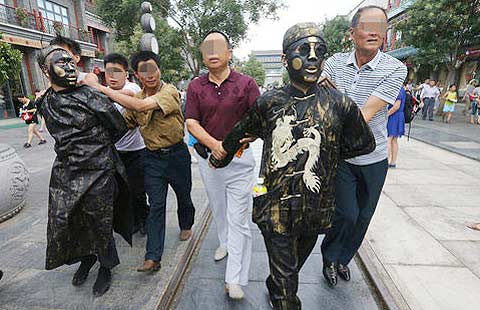Saving time and money, and changing lives
Updated: 2014-07-18 08:25
By Hu Haiyan (China Daily Europe)
|
|||||||||||
Passengers sing the praises of high-speed train travel
The high-speed travel made possible by China's rapidly expanding bullet train network is proving a massive boon to people from all walks of life, saving them time, money and offering a more pleasant travel experience.
Simon Mellon, head of the trade and investment section of the British consulate-general's office in Chongqing, is one of those.
"Using the fast trains it now takes much less time and money to get around China than it used to," he says.
"The network is already amazing, and it continues to expand. I am planning to do a tour of the country, and doing that using high-speed rail, from north to south, east to west will help me enjoy that adventure in a more convenient and economical way."
The Chongqing-Shanghai high-speed link, which began on July 1, means tourists can now make the long land journey in 14 hours at a cheaper price than flying.
"I can have breakfast in Chongqing, then enjoy the night views of Shanghai the same day, very cheaply," adds Mellon.
Further north, before the Beijing-Tianjin high-speed train began running in 2007, it took about two hours to travel by bus or normal train between the capital and the largest coastal city in northern China. That time has now been slashed to a little over 30 minutes.
On board a train speeding to Shanghai from Beijing, Yang Yang, 25, a marketing consultant with Force IMC Consulting in Beijing, says the introduction of the link between the cities has made a dramatic change to his life.
"It is very convenient for us to go back home on the high-speed train, and we can now even book tickets on the Internet," says Yang.
"I used to have to take a bus and needed to get to the bus station to buy my ticket ahead of time to ensure there were any available, which could be very inconvenient.
"The fast train means I can go back home almost every weekend."
Some of his friends who work in Beijing and who cannot afford the capital's increasingly expensive property prices have even chosen to live in Tianjin and commute using the high-speed train.
"High-speed rail travel has changed the way we live," says Yang, as he grabs a meal in the smart dining car.
"And the food on this train is a lot better than what is offered on planes or normal trains."
On Yang's service that day, almost all of the first and regular-class seats were taken.
Many of those onboard were clearly enjoying a relaxing journey, with the added comfort of having strong communications signals available for mobile phones, laptops, tablets or reading books.
Lu Yao, CEO of Nanjing Huizhu Technology Co Ltd, says that unlike commercial air travel, high-speed trains are always on time, which is so important for business people like him.
"High-speed rail services are never delayed or cancelled. Given a choice between this and flying, I'll always choose rail. On the train I can also charge and use my mobile phone and computer, which increases my productivity."
Most of Lu's business is done in an area that takes in Shanghai, Beijing and Nanjing, so he uses the Shanghai-Nanjing and Beijing-Shanghai high-speed routes to commute between the cities, usually in first class.
"This is much less expensive than first class air tickets. But the seats themselves are spacious and quiet, and make my trip a lot more enjoyable."
A World Bank report earlier this month claimed that average seat occupancy on China's high-speed rail system is running at 70 percent.
The report adds that second-class fares on high-speed rail vary between $0.045 a km at 200 to 250 km an hour and $0.077 at 300 to 350 km an hour.
Those prices are three to four times that of conventional express trains, but lower or comparable to discounted airfares, and about a quarter or a fifth of the cost of other countries that have high-speed rail.
Sergio Maffettone, the consul-general of Italy in Chongqing, says he always travels from there to Chengdu on high-speed trains, taking just two hours, and next year that journey time will be cut in half.
"I prefer high-speed rail to flying, and I often use the Beijing-Shanghai and the Chongqing-Chengdu services.
"Airports can take time to get to because they are generally a long way from city centers, whereas high-speed rail stations are usually right in a city center," he says.
"Going through railway station security checks is also a lot easier than those at airports.
"China's high-speed rail is fantastic and certainly one of the world's most advanced. Service is good, seats are comfortable, and despite the exceptionally high speeds it is very safe."
There is very little difference between first-class and normal seats on the trains, he adds. "Both are clean, and the service is good."
However, he does have one tip on how the travel experience for all high-speed train passengers could be improved.
There needs to be more reliable Wi-Fi services on some routes, which would help raise passengers' productivity, he adds.
huhaiyan@chinadaily.com.cn
(China Daily European Weekly 07/18/2014 page7)
Today's Top News
Burning wreckage, bodies scattered after jet downed
US widens sanctions on Russia over Ukraine
Hamas agrees on 5-hr ceasefire
Chinese killed in Moscow metro derailment
Obama vows info co-op to Merkel
Filipinos flee as typhoon hits coast
China ends drilling operations in South China Sea
Economic ties with Latin America grow
Hot Topics
Lunar probe , China growth forecasts, Emission rules get tougher, China seen through 'colored lens', International board,
Editor's Picks

|

|

|

|

|

|





